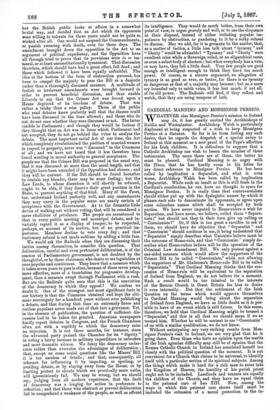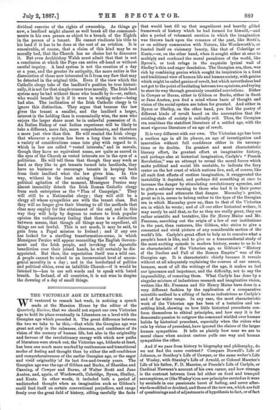CARDINAL MANNING AND MONSIGNOR PERSICO.
WHATEVER else Monsignor Persico's mission to Ireland may do, it has greatly excited the Archhiehops of Dublin and Westminster. Archbishop Walsh is particularly displeased at being suspected of a wish to keep Monsignor Persico at a distance. So far is he from feeling any such desire, that he regards the despatch of a special envoy to Ireland at this moment as a new proof of the Pope's affection for his Irish children. It is ridiculous to suppose that a Catholic Archbishop can wish to lessen the number of these testimonies. The more there are of them. the better he must be pleased. Cardinal Manning is so angry with the Times, that he has hardly room in his letter for any direct reference to Monsignor Persico. He has been called by implication a Separatist, and what is even worse, Archbishop Walsh has been called by implication a Separatist. While such an insult as this is still fresh in the Cardinal's recollection, he can have no thought to spare for Monsignor Persico. It is really time that controversialists should either put up with the dyelogistic names by which it pleases each side to denominate its opponents, or agree upon some colourless names which shall be accepted by both parties. We have never imputed to Home-rulers a wish for Separation, and have never, we believe, called them " Separa- tists ;" but should not they in their turn give up calling us " Coercionista I" Or, if this is too great a sacrifice to ask of them, we should have zio objection that " Separatist " and " Coercionist " should continue in use, it being understood that " Separatist " simply describes what Unionists believe must be the outcome of Home-rule, and that " Coercionist." simply de- scribes what Home-rulers believe will be the operation of the Criminal Law Amendment Bill. We only protest against a one-sided measure which would allow the supporters of the Crimes Bill to be called " Coercioniste," while not allowing the supporters of Mr. Gladstone's Home-rule Bill to be called " Separatists." That Cardinal Manning thinks that the con- cession of Home-rule will be equivalent to the separation of Ireland from England, we do not believe for a moment. Such a result would be too inimical to the interests of the Roman Church in Great Britain for him to desire it even internally. But that the settlement of the Irish Question on the terms which would approve themselves to Cardinal Manning would bring about the separation of Ireland from England, we have as little doubt as it is pos- sible to have of an event which is still future. In this sense, therefore, we hold that Cardinal Manning might be termed a "Separatist," and this is all that we should mean if we so termed him. Whether he will be content to use "Coercionist" of us with a similar qualification, we do not know.
Without anticipating any very striking results from Mon- signor Persico's visit to Ireland, we are very glad that he is going there. Even those who have no opinion upon the merits of the Irish agrarian difficulty may still be of opinion that the Roman Catholic Church in Ireland has associated herself too closely with the political question of the moment. It is not convenient for a Church that claims to be universal, to identify itself with a particular section of its spiritual subjects. Among the things which make it hard for a rich man to enter into the Kingdom of Heaven, the hostility of his parish priest ought not to be included. Landlords and tenants are equally the children of the Church, and they have an equal claim to the paternal care of Leo XIII. Now, among the ways in which this paternal care shows itself must be included the extension of a moral protection to the in-
dividnal exercise of the rights of ownership. As things go now, a landlord might almost as well break all the command- ments in his own person as object to a breach of the Eighth in the person of a tenant. He cannot vindicate his title to his land if it has to be done at the cost of an eviction. It is conceivable, of course, that a claim of this kind may be so morally bad, that the Church has no choice but to denounce it. But even Archbishop Walsh must admit that that is not a conclusion at which the Pope can arrive off-hand or without careful inquiry. A land system is not the creation of a day or a year, and the greater its antiquity, the more entire is the dissociation of those now interested in it from any flaw that may be detected in the original title. Even if the view which the Catholic clergy take of the landlord's position be true histori- cally, it is not for that simple reason true morally. The Irish land system may be bad without those who benefit by it—or, rather, who would benefit by it if it were in working order—being bad also. The inclination of the Irish Catholic clergy is to ignore this distinction. They argue that because the law gives the tenant a smaller, and the landlord a larger, interest in the holding than is economically wise, the man who enjoys the larger share must be in unlawful possession of it. An Italian Bishop of vast Indian experience will be likely to take a different, more fair, more comprehensive, and therefore a more just view than this. He will remind the Irish clergy that wherever a system has been a long time in existence, a variety of considerations come into play with regard to it which in law are called " vested interests," and in morals, though they have no equivalent name, are quite as sacred in the eyes of the Church as vested interests are in the eyes of a politician. He will tell them that though they may work as hard as they like to get tenants turned into landlords, they have no business to encourage tenants in keeping back from their landlord what the law gives him. In this way, without in the least mixing himself up with the political agitation of the moment, Monsignor Persico may almost insensibly detach the Irish Roman Catholic clergy from such enterprises as the " Plan of Campaign." They will still be a Nationalist clergy ; they will still be a clergy all whose sympathies are with the tenant class. But they will no longer give their blessing to all the methods that class may employ for the attainment of the end, and in this way they will help by degrees to restore to Irish popular opinion the rudimentary feeling that there is a distinction between means, that though all things may be expedient, all things are not lawful. This is not much, it may be said, to gain from a Papal mission to Ireland ; and if any one has looked for a startling transformation-scene, in which Monsignor Persico will appear reconciling the English Govern- ment and the Irish people, and invoking the Apostolic benediction over their joined hands, he will certainly be dis- appointed. But then, the expectation itself was a wild one. A people cannot be raised to an inconvenient level of uncon- genial morality in a day ; and in the borderland of politics and political ethics, even an infallible Church—if it would be listened to—has to use soft words and to speak with bated breath. In Ireland, of all countries, it is not wise to despise the dawning of a day of small things.



































 Previous page
Previous page